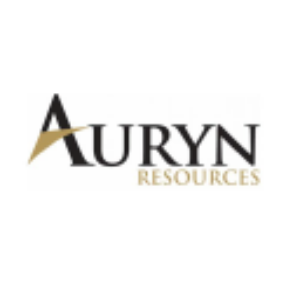Auryn Identifies 12 Drill Targets at Committee Bay and Plans to Expand the Three Bluffs Resource
Auryn Resources has identified twelve refined drill targets across the Committee Bay gold belt in Nunavut, aiming to expand the Three Bluffs deposit and explore the Aiviq - Kalulik corridor. The new targets arise from advancements in understanding high-grade gold systems based on geophysical conductivity data. The 2021 drill program will evaluate these targets, which include high-grade mineralization zones. Auryn's collaboration with Fury Gold Mines strengthens this initiative, with an emphasized potential for significant gold discoveries in the region.
- Identification of twelve refined drill targets in the Committee Bay gold belt.
- Advancements in understanding high-grade gold systems based on geophysical data.
- Collaboration with Fury Gold Mines enhances exploration efforts.
- Potential for multiple world-class gold discoveries in Committee Bay.
- None.
Insights
Analyzing...
VANCOUVER, BC / ACCESSWIRE / September 29, 2020 / Auryn Resources Inc. (TSX:AUG)(NYSE American:AUG) ("Auryn" or the "Company") is pleased to announce twelve refined targets across the Committee Bay gold belt in Nunavut that aim to leverage the targeting breakthrough along the Kalulik - Aiviq structural corridor and the Anuri target area, as well as expand upon the Three Bluffs deposit. The targets are within known gold-bearing systems and were derived using the technical team's critical new understanding of high-grade (+5 g/t gold) systems across the belt based on geophysical conductivity data collected since Auryn has worked on the project. The 2019 targeting breakthrough enabled Auryn to empirically determine the system drivers that define high-grade across the belt, as presented in Figure 1.
The planned 2021 summer drill program will test both target extensions at the Three Bluffs deposit as well as several regional greenfield targets (Figures 2-9).
A Message from Ivan Bebek, Executive Chairman & Director:
"Committee Bay is one of few exploration opportunities globally with the potential for multiple world-class gold discoveries. Our confidence has grown considerably over the past five years as our technical team's targeting methods have evolved. We are excited to capitalize on our extensive work to-date with Fury Gold Mines in the current gold environment."
Target Types:
There are two principal target types that have been derived through the relationships between the highest conductivity responses and their association with magnetics data. The gold-bearing systems directing the targets have been defined either by drilling, gold-bearing boulder trains, or gold in till anomalies (Figure 2). The two target types are defined as follows:
- Iron Formation Hosted in Sediments: where high conductivity responses are associated with sulphidation of the host rock and slightly subdued magnetic responses that are associated with demagnetization of the iron formation due to hydrothermal alteration.
- Iron Formation - Komatiite Couplets: where high conductivity responses and high magnetic responses are offset from each other. The target in this case is the gradient where high conductivity and high magnetic responses are adjacent to each other.
Three Bluffs Deposit Targets:
There are two approaches with respect to targeting at the Three Bluffs deposit: 1) Resource expansion where Auryn has interpreted geophysical data to be associated with potential second order fold hinges within the anticline that hosts the Three Bluffs deposit, and 2) Defining new pods of mineralization along sub-parallel fold hinges to the north of the Three Bluffs deposit.
Resource expansion targets associated with interpreted second order fold hinges within the Three Bluffs anticline are presented in Figures 3 & 4. In Figure 3, Target 1 located near the eastern margins of the deposit is situated below the limit of drilling of the deposit at a vertical depth of 370 - 530 meters. In Figure 4 the Antler target is located in the western portion of the deposit beneath 20 - 25 meters of 2 g/t Au mineralization in drill holes. The widening of magnetics data associated with high conductivity values suggests the potential of a second order fold hinge at a vertical depth between 350 - 600 meters.
Targets focused on defining new pods of gold mineralization adjacent to the current resource are presented in Figure 3. Targets 2 & 3 are associated with interpreted sub-parallel folds to the Three Bluffs anticline. These targets are characterized by high conductivity responses situated at 200 - 420 meters and 300 - 530 meters depth beneath the surface. Both targets are undrilled and are associated with magnetic gradients interpreted as hydrothermal alteration.
Aiviq - Kalulik Corridor & Anuri Targets:
Along the Aiviq - Kalulik 20 km structural corridor a high conductivity fold hinge zone has been defined through the leveling of the conductivity data by lithology. At the Aiviq target, a high conductivity fold hinge has been defined that is coincident with high-grade boulder trains. It is situated four kilometers northeast of Auryn's previous drilling, where 12.2 meters of 4.7g/t Au was intercepted within a sequence of highly silicified and sulphidized iron formations (Figures 5 & 6) (see September 14, 2017 news release). This target is characterized by a high conductivity response and a magnetic low that is consistent with an iron formation that is interpreted to be hydrothermally altered.
The Kalulik target is characterized by an iron formation - komatiite couplet within a broad synclinal fold hinge where high conductivity values are offset from magnetic highs. Previous shallow drilling from Auryn has intercepted 16.8 meters at 0.49 g/t Au and 16.8 meters at 0.45 g/t Au in areas above interpreted hinge zones. The conceptual drill holes target high conductivity features immediately adjacent to magnetic highs (Figure 7).
The Anuri targets (Anuri and Enigma Lake) are characterized by fold hinges that host iron formation - komatiite couplets within a broad flat lying fold (Figures 8 & 9). These targets are supported by the strongest gold-in-tills response within the Committee Bay gold belt and numerous high-grade boulder trains. Previous historical drilling of up to 14.8 meters at 2.66 g/t Au and 13.7 meters of 1.91 g/t Au has not intercepted the gradient between the high conductivity and magnetics signatures that represent the primary hinge zone targets. There is a total of six geophysical targets within the flat lying fold at Anuri that remain completely untested.
A Message from Michael Henrichsen, COO & Chief Geologist:
"We have drilled the desired widths of gold mineralization at Committee Bay, however targeting high-grade gold through the thin layer of till cover that obscures the mineralized systems has been a challenge. We believe our major geophysical breakthrough is essential for targeting high-grade through the till sequences and look forward to our 2021 drill program."
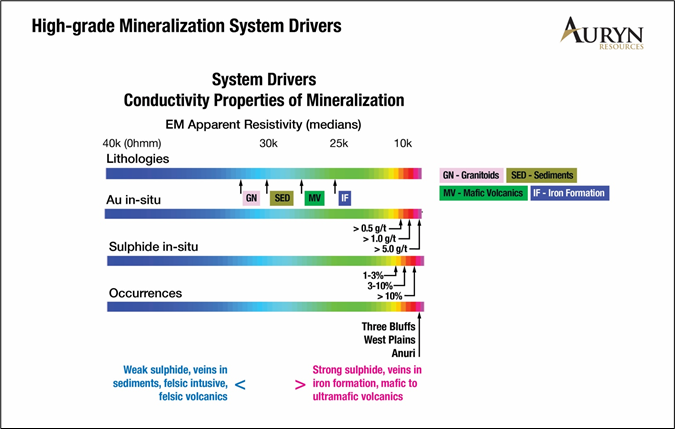
Figure 1: Illustrates the system drivers for high-grade mineralization within the Committee Bay gold belt. Note that the high-grade mineralization (in-situ) is associated with the highest conductivity values as illustrated by the Three Bluffs deposit and the West Plains and Anuri prospects.
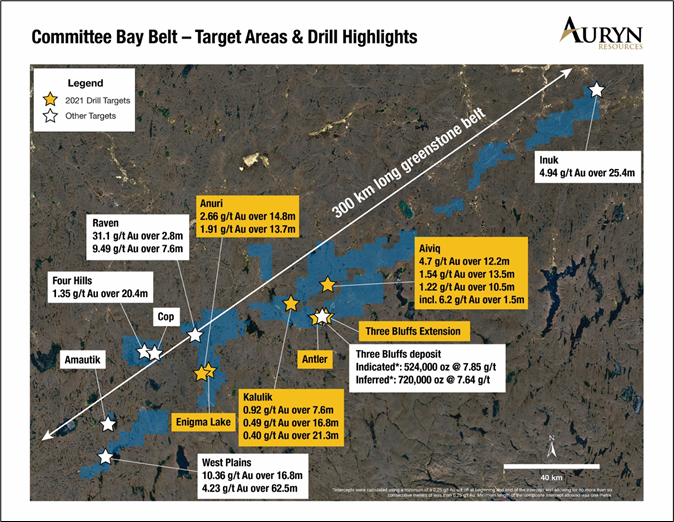
Figure 2: Illustrates the location of newly derived drill targets across the Committee Bay gold belt.
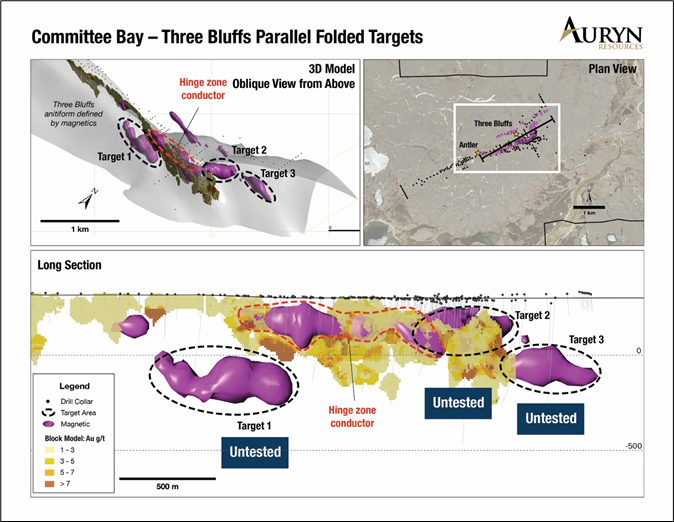
Figure 3: Illustrates three high conductivity targets associated with the Three Bluffs deposit. Target 1 is considered a resource expansion; whereas targets 2 and 3 are aiming to define new pods of mineralization along interpreted second order folds within the larger Three Bluffs antiform.
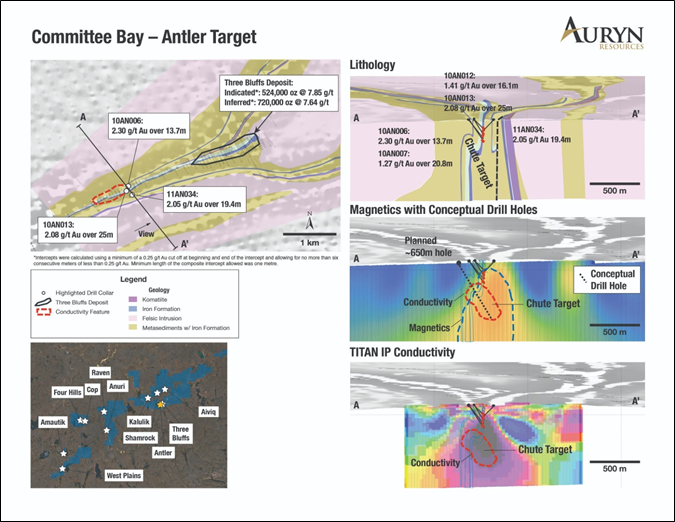
Figure 4: Illustrates the resource expansion Antler target where both conductivity and magnetics data expand at depth beneath the drilled mineralization. The expansion of these geophysical signatures is interpreted as a second order fold hinge zone target.
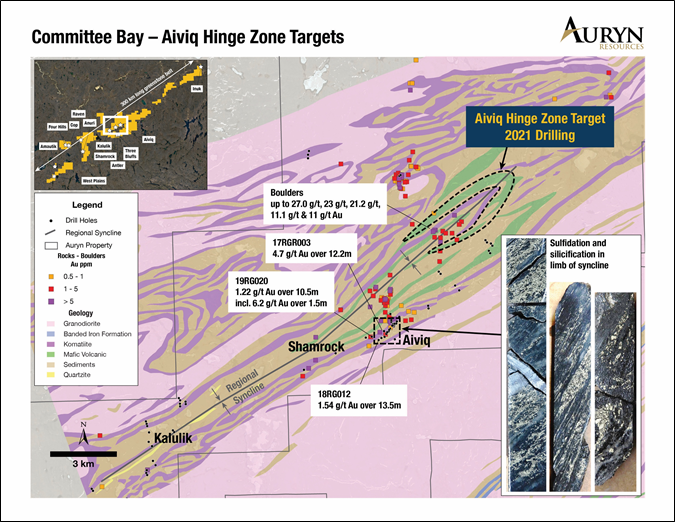
Figure 5: Illustrates the Aiviq hinge target to the northwest of Auryn's 2019 drilling where a strongly altered hydrothermal system was encountered along the southern limb of a regional syncline. The hinge zone has not been drilled and is associated with high-grade boulders up to 27 g/t Au.
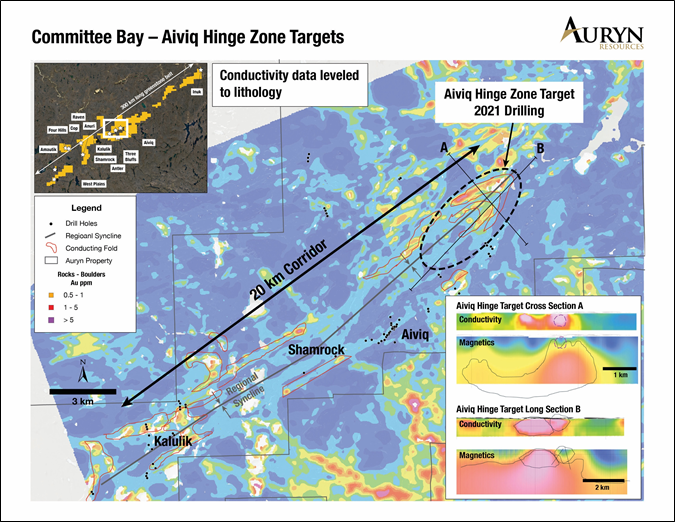
Figure 6: Illustrates the Aiviq hinge target to the northwest of Auryn's 2019 drilling where a strongly altered hydrothermal system was encountered along the southern limb of a regional syncline. The hinge zone is characterized by a magnetic low, indicating the potential for strong hydrothermal alteration, and a conductivity high, indicating the potential for sulphidation.
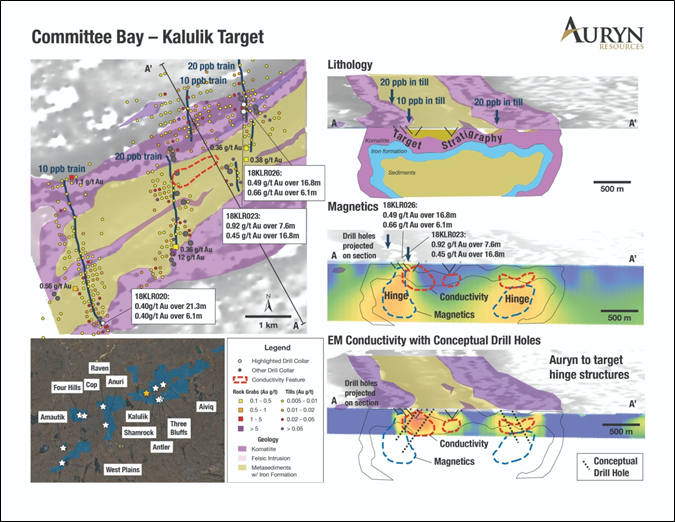
Figure 7: Illustrates the target at the Kalulik prospect that is characterized by an iron formation - komatiite couplet. Previous shallow drilling in areas above the interpreted hinge zones has intercepted 16.8 meters at 0.49 g/t Au and 16.8 meters of 0.45 g/t Au. The conceptual drill holes target high conductivity features immediately adjacent to magnetic highs.
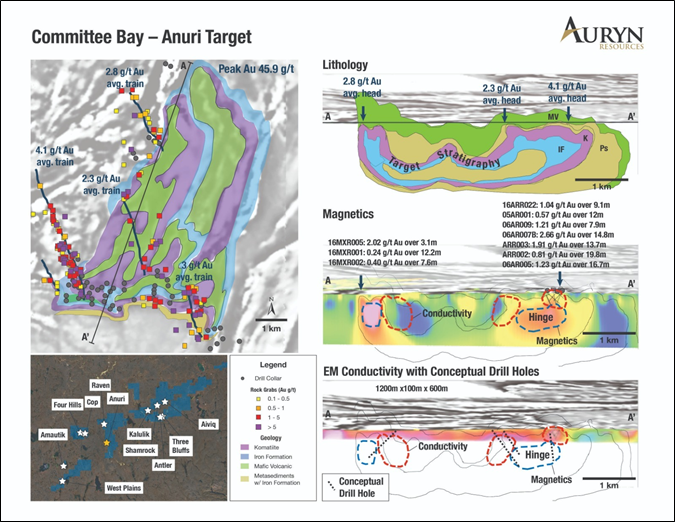
Figure 8: Illustrates the targets at the main Anuri prospect that are characterized by fold hinges that host iron formation - komatiite couplets within a broad flat lying fold. These targets are supported by the strongest gold-in-tills response within the Committee Bay gold belt and numerous high-grade boulder trains. Previous historical drilling of up to 14.8 meters of 2.66 g/t Au and 13.7 meters of 1.91g/t Au has not intercepted the targets that are defined by the gradient between high conductivity and magnetic signatures.
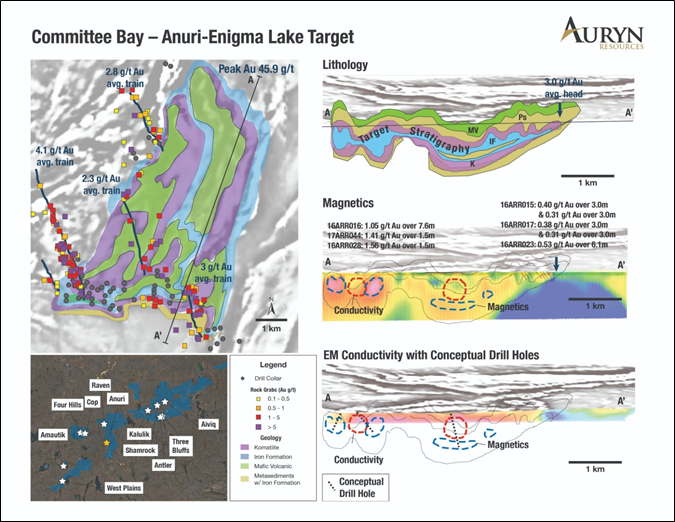
Figure 9: Illustrates the targets at the Enigma Lake prospect that are characterized by fold hinges that host iron formation - komatiite couplets within a broad flat lying fold. These targets are defined by the gradient between high conductivity and magnetic responses that have not been drill tested.
Michael Henrichsen (Chief Operating Officer), P.Geo is the QP who assumes responsibility for the technical contents of this press release.
ON BEHALF OF THE BOARD OF DIRECTORS OF AURYN RESOURCES INC.
Ivan Bebek
Executive Chairman and Director
For further information on Auryn Resources, please contact Natasha Frakes, Manager of Corporate Communications at (778) 729-0600 or info@aurynresources.com.
About Auryn
Auryn Resources is a technically driven, well-financed junior exploration company focused on finding and advancing globally significant precious and base metal deposits. The company built a portfolio of six projects in Canada and Peru containing gold, silver and copper resources and exploration targets. In July 2020, Auryn announced its intention to spin out its Peruvian assets into two new companies and acquire Eastmain Resources, creating a Canadian gold-focused exploration and development company to be renamed as Fury Gold Mines. Upon closing of the spinout and acquisition transactions, expected in October 2020, Fury's three core assets will comprise of Eau Claire in Quebec, Committee Bay in Nunavut and Homestake Ridge in British Columbia. Auryn shareholders, invested prior to the completion of the transactions, will become shareholders of Fury and will also receive shares in the two new Canadian spin out companies, one holding the Sombrero copper-gold project, and the other holding both the Curibaya silver-gold project and Huilacollo gold project.
Committee Bay Drilling QA/QC Disclosure
Intercepts were calculated using a minimum of a 0.25 g/t Au cut off at beginning and end of the intercept and allowing for no more than six consecutive meters of less than 0.25 g/t Au.
RAB Drilling
Analytical samples were taken using 1/8 of each 5ft (1.52m) interval material (chips) and sent to ALS Lab in Yellowknife, NWT, Thunder Bay, ON, and Vancouver, BC for preparation and then to ALS Lab in Vancouver, BC for analysis. All samples are assayed using 30g nominal weight fire assay with atomic absorption finish (Au-AA25) in 2017 and part of 2018 or 50g nominal weight fire assay with atomic absorption finish (Au-AA26) in 2015, 2016, part of 2018, and 2019 and multi-element four acid digest ICP-AES/ICP-MS method (ME-MS61). QA/QC programs using internal standard samples, field and lab duplicates and blanks indicate good accuracy and precision in a large majority of standards assayed.
True widths of mineralization are unknown based on current geometric understanding of the mineralized intervals.
Core (diamond) Drilling
Analytical samples were taken by sawing NQ diameter core into equal halves on site and sent one of the halves to ALS Lab in Vancouver, BC for preparation and analysis. All samples are assayed using 50g nominal weight fire assay with gravimetrical finish (Au-GRA22) in year 2016 and with atomic absorption finish (Au-AA26) in 2018 and multi-element four acid digest ICP-AES/ICP-MS method (ME-MS61). QA/QC programs using internal standard samples, field and lab duplicates and blanks indicate good accuracy and precision in a large majority of standards assayed.
Based on the estimated geometry of the mineralized zones, the true widths of the intervals drilled at the Three Bluff deposit are believed to be at approximately 40
CB Grabs
Approximately 1-2kg of material was collected for analysis and sent to ALS Lab in Vancouver, BC for preparation and analysis. All samples are assayed using 50g nominal weight fire assay with atomic absorption finish (Au-AA26) and multi-element four acid digest ICP-AES/ICP-MS method (ME-MS61). QA/QC programs for rock grab samples using internal standard samples, lab duplicates, standards and blanks indicate good accuracy and precision in a large majority of standards assayed. Grab samples are selective in nature and cannot be consider as representative of the underlying mineralization.
CB Infill Tills 2017-2019
Samples (250g) of unweathered till were collected from 20-30cm depth in frost boils at 100m sample spacing. Pebbles (>1cm) were removed in the field. Samples were not collected in areas of glaciofluvial or fluvial reworking. Collected samples were sent to ALS Laboratories in Vancouver BC for preparation and analysis. All samples are screened using 600µm screen and analyzed using 50g nominal weight trace level Au by aqua regia extraction and ICP-MS finish method (Au-TL44) on a -600µm fraction. QA/QC programs using internal standard samples, field and lab duplicates, re-assays, and blanks indicate good overall accuracy and precision.
CB Tills 2016-2018
Till samples were collected mostly from active frost boils. Samples from 3 to 5 kg each sent to ALS Lab in Vancouver, BC for preparation and analysis. All samples are analyzed using Ultra-Trace Au by Cyanide Extraction and ICP-MS finish method (Au-CN44) and ultra-trace multi-element aqua regia digest ICP-AES/ICP-MS method (ME-MS41L). QA/QC programs using internal standard samples, field and lab duplicates, re-assays, and blanks indicate good accuracy and precision in a large majority of standards assayed.
Forward Looking Information and Additional Cautionary Language
This release includes certain statements that may be deemed "forward-looking statements". Forward-looking information is information that includes implied future performance and/or forecast information including information relating to or associated with the acquisition and title to mineral concessions. These statements involve known and unknown risks, uncertainties and other factors which may cause actual results, performance or achievements of the Company to be materially different (either positively or negatively) from any future results, performance or achievements expressed or implied by such forward-looking statements. Readers should refer to the risks discussed in the Company's Annual Information Form and MD&A for the year ended December 31, 2019 and subsequent continuous disclosure filings with the Canadian Securities Administrators available at www.sedar.com and the Company's registration statement on Form 40-F filed with the United States Securities and Exchange Commission and available at www.sec.gov.
The Toronto Stock Exchange has not reviewed and does not accept responsibility for the adequacy or accuracy of this release.
SOURCE: Auryn Resources Inc.
View source version on accesswire.com:
https://www.accesswire.com/608221/Auryn-Identifies-12-Drill-Targets-at-Committee-Bay-and-Plans-to-Expand-the-Three-Bluffs-Resource







